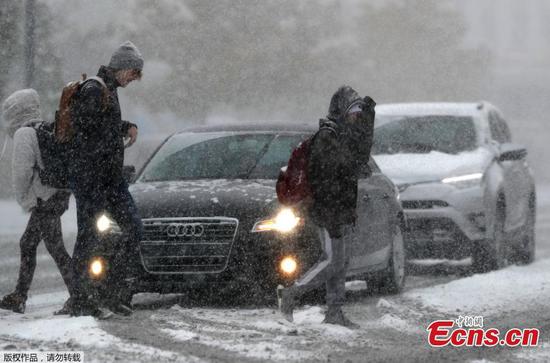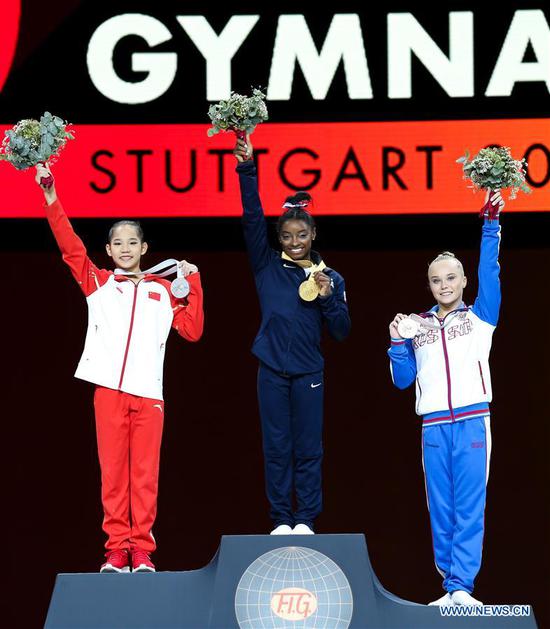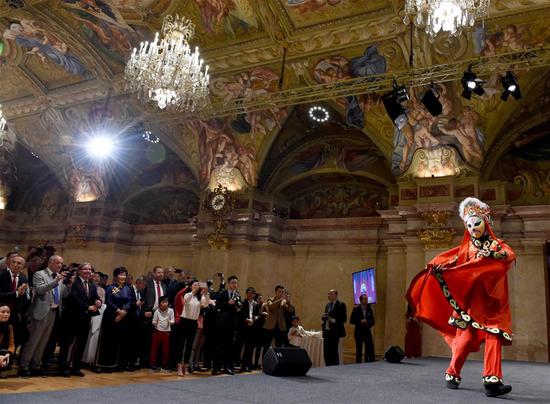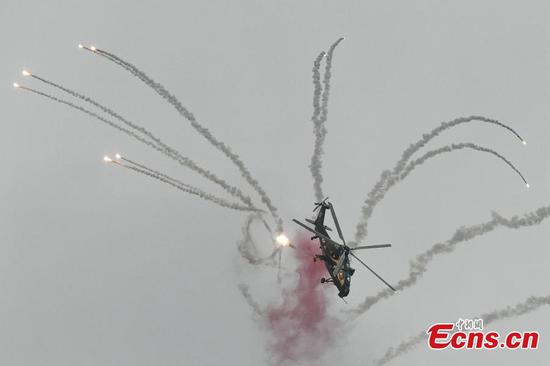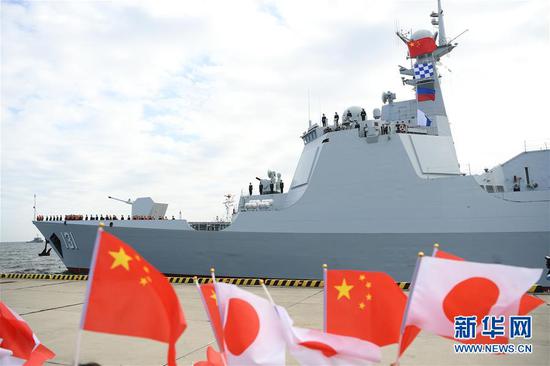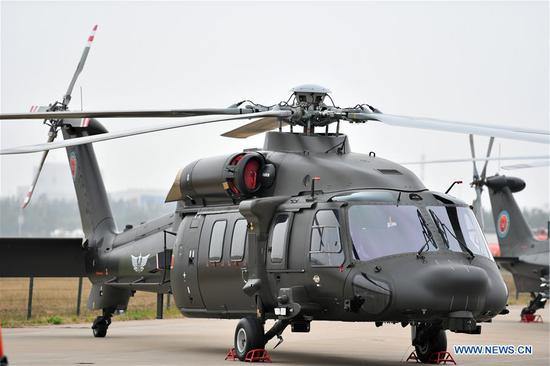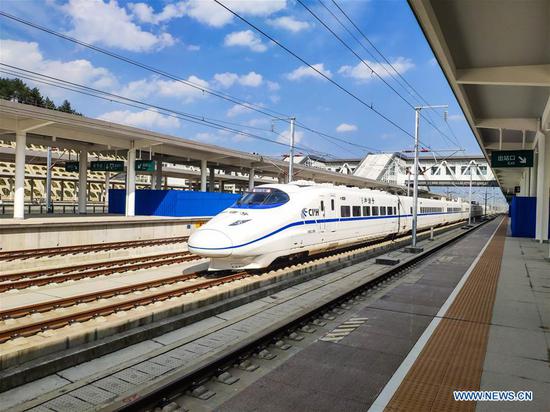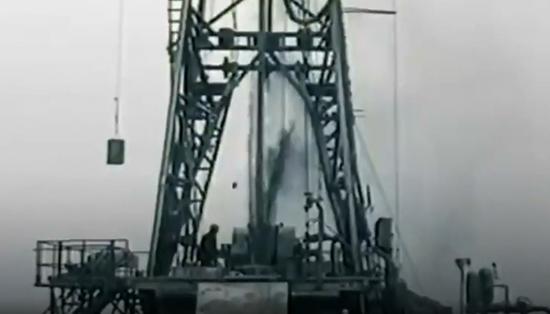The United States plans to impose punitive tariffs on goods from the European Union (EU), a move granted by the World Trade Organization (WTO) last week, casting shadows on the transatlantic relationship.
The WTO said on Oct. 2 that the United States could impose tariffs on 7.5 billion U.S. dollars of European exports as the bloc failed to comply with the WTO's ruling regarding government subsidies for the European aircraft manufacturer Airbus.
On the same day, the United States said it will impose tariffs on a wide range of EU goods starting Oct. 18.
In response, the EU said any countermeasures taken by the U.S. side would be "short-sighted and counterproductive," adding that it would be granted similar tariff rights to U.S. products in the next year.
It is the latest twist in the 15-year-long U.S.-EU battle over aircraft subsidies. The tensions between the world's largest economy and the largest trading bloc cast a shadow over the global economy that is already faced with a prolonged slowdown.
15-YEAR BATTLE
Washington and Brussels have locked themselves in a grueling dispute settlement process at the WTO since 2004, featuring tit-for-tat appeals and counter-appeals against each other.
As the United States accuses the EU of subsidizing Airbus and the EU challenges the United States for illegally aiding Boeing, both sides claimed partial victory along the way.
In March 2012, the WTO ruled that at least 5 billion dollars' worth of U.S. subsidies to Boeing were illegal, notifying the United States to scrap them.
In June 2017, the WTO agreed with the EU in a ruling saying that the United States had not fully complied with the 2012 request asking it to remove the subsidies, citing the case of Washington State's tax breaks.
In May 2018, the WTO ruled that the EU failed to halt subsidies to Airbus and that these continue to harm Boeing.
In March 2019, the WTO said the U.S. side failed to end subsidized tax breaks to Boeing.
Each side accused the other of failing to comply with the WTO's rulings and refusing to negotiate any settlement.
The above cases were essentially a tit-for-tat litigation battle between Boeing and Airbus under a multilateral framework, said a researcher from the Center for Trade and Economic Integration of the Graduate Institute Geneva who chose to remain anonymous. The timetable and strategy from both sides were almost "synchronized," the researcher added.
Last week's ruling is the largest arbitration award in the history of the WTO. The second largest also involved the two sides, which is the 4 billion U.S. dollars authorized to EU in 2003 against U.S. tax subsidies under the Foreign Sales Corporation scheme.
A more recent episode of the feud came last year, when the Unites States announced tariffs on steel and aluminum imports and Europe later imposed retaliatory tariffs on U.S. Bourbon whiskey and Harley Davidson motorcycles, among other things.
Apart from the trade issues, the traditional friendship across the Atlantic has been facing tests as some European countries are critical of the U.S. unilateral stance on the Iranian nuclear issue.
"NOT BENEFIT ANYONE"
According to a recent statement from the Office of the U.S. Trade Representative, new airplanes and other aircraft from Britain, France, Germany and Spain are subject to additional tariffs of 10 percent, while Scotch whiskeys, cheese, olives, yogurt, and sweaters from Britain are among the products to be hit by an additional tariff of 25 percent.
Airbus said in a statement that those tariffs will create "insecurity and disruption" not only to the aerospace industry, but also to the broader global economy.
Noting that the additional tariffs are "still avoidable," Airbus said the only way to prevent the negative effects of these tariffs would be for the United States and EU to find a solution to this long-running dispute through a negotiated settlement.
Several European countries expressed similar views that they stand ready to react if a negotiated solution is not possible in the coming weeks.
"Trade conflicts, as well as being short-sighted, do not benefit anyone and prejudice both producers and consumers," the government of Spain said in a statement, adding that it would "immediately react firmly and clearly to defend the interests of our citizens and companies" if the U.S. administration rejected dialogue.
The French Foreign Ministry said that France and its European partners would take firm countermeasures if Washington went ahead with imposing tariffs.
The EU would prefer "an amicable settlement" in this 15-year-old dispute and the development of new common rules on government support for aviation companies, said French Foreign Ministry spokesperson Agnes von der Muhll last week. "Unfortunately, the United States does not seem ready to negotiate at this stage."
UNCERTAINTY IN WORLD ECONOMY
Just a day before the arbitration award was announced, the WTO said its economists "sharply" downgraded global trade growth forecast to only 1.2 percent in 2019, substantially slower than the 2.6-percent forecast in April, while cautioning "downside risks remain high" in 2020.
"Trade retaliation is always sub-optimal and the timing is unfortunate given the high level of tension and uncertainty in the world economy," said Alan Yanovich, partner at Akin Gump Strauss Hauer &Feld LLP's Geneva office with specialization on litigation of disputes before the WTO.
The United States and the EU must look for ways to de-escalate, Yanovich said. "They must find a way to manage this dispute in a way that does not disrupt the wider world economy."
The looming U.S. punitive tariffs on European products "will further cloud the transatlantic atmosphere," said Ulrich Ackermann, head of the foreign trade department of the German Mechanical Engineering Industry Association.
Ackermann said that the signs so far did not point to a constructive course for solving transatlantic trade issues but were "more reminiscent of a ping-pong game."
The export-oriented German manufacturing sector has been hit by weak global demand for some while. The latest data showed the country's industrial production had witnessed two months of decline before it slightly rebounded with a 0.3-percent increase in August.
Meanwhile, the United States and the EU are working on a limited trade agreement that would cut tariffs for industrial goods, but the transatlantic trade talks have reached an impasse over whether to include agriculture in the negotiations.
Furthermore, U.S. President Donald Trump previously extended the deadline to decide whether to impose tariffs on imported automobiles until mid-November, keeping European automakers in suspense.
"If the U.S. introduces additional car duties for deliveries from the EU, then the transatlantic trade talks will be deprived of oxygen and dead," Ackermann said.










